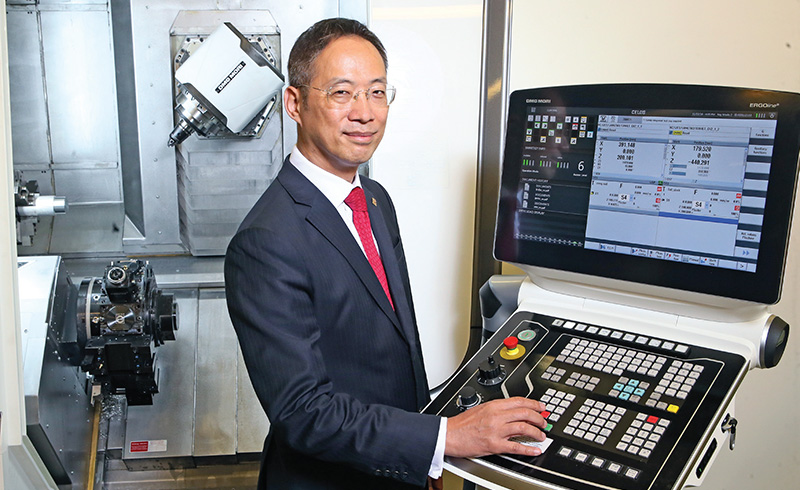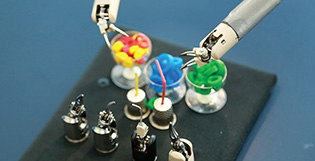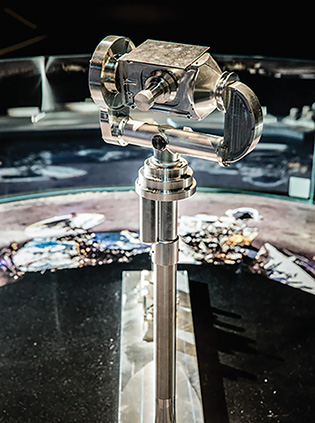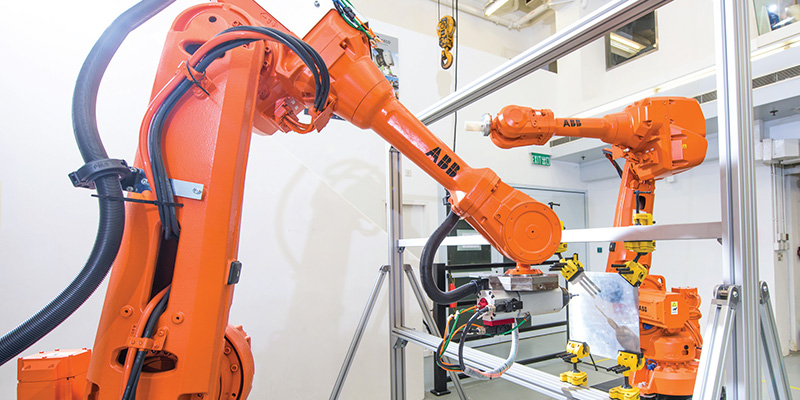
Ir Prof. Alexander Wai Ping-kong
Research is a key university portfolio. It advances knowledge frontier and fosters the development of a society. PolyU’s Vice President (Research Development) Ir Prof. Alexander Wai spoke to PolyU Milestones about the difference between the University’s research and those of its local peers, and how it is working to enlarge its impact on the world stage.
What differentiates PolyU’s research from those of other local universities?

The Novel Surgical Robotic System that allows surgeons to perform operations with just a single incision or by passing through a natural orifice.
The major difference is PolyU’s unique research culture. Our focus is not just on knowledge-for-knowledge’s-sake research, but also on research that has a direct influence on society. Knowledge transfer is the third mission of modern universities, following education and research, and we know our research makes a positive impact to our economy and society.
To many researchers, it is important to realise their academic pursuit. But to society, it is more important to have the research applied for the benefit of mankind. For instance, the optical fibre sensing technology developed at the University, which allows the continuous monitoring and timely maintenance of railway systems, has been deployed on Hong Kong’s MTR, Singapore’s SMRT and Chinese mainland’s High Speed Rail. How we have chosen to apply photonics to make a better world, be it in railway monitoring or data transmission is a matter of strategy, given limited time and resources. Another strategy to take research to a new level of excellence is to adapt technologies developed in one area to another. One very good example of that is the Novel Surgical Robotic System jointly developed with The University of Hong Kong, which has drawn on our expertise in designing precision tools for space exploration to transform robotic surgery.
What are the greatest challenges PolyU faces in applying technologies to solving such real-life problems?
Research takes years to bear fruit, and real-life applications are much more demanding than the demonstration of principles in laboratories. It took, for instance, a lot of work to go from Alexander Graham Bell’s discovery of the principle of telephones to the modern telephone system. In the well-known technology readiness level chart, there is a big gap between academic research and industry research.
In a fast changing world in which technological advancements can change our lives any minute, the foresight and vision to discern what the society needs and who to partner with are important for making the right decisions. For example, we planned to venture into space with China well before anyone can imagine the latter would have a role to play in space exploration.
How does PolyU support researchers to overcome this challenge?

The highly compact and lightweight Camera Pointing System captured images of the moon’s surface and beamed back clear images to Earth.
Most importantly, the University offers a mutually supportive, interdisciplinary and forward-thinking research environment, encouraging collaboration across fields. We established the Research Salon to provide a platform on which researchers from various disciplines can exchange ideas and inspire each other. We have also developed a new research resource allocation model and have worked hard to attract research funding from government bodies and industries in Hong Kong. In the Chinese mainland, we established the Shenzhen Base to solicit research funding from the mainland government.
Another crucial way in which we help our researchers is through building partnerships with government agencies and leading companies to conduct cutting edge research with application potential. For instance, PolyU collaborated with the China Academy of Space Technology to design and fabricate the camera pointing system used in China’s historic Chang’e 3 lunar lander. We also joined hands with communications giant Huawei to establish the PolyU-Huawei Joint Laboratory for Optical Interconnection Network and Advanced Computing System in 2016. The joint lab is now conducting pioneering research on high-capacity optical communications systems that will have wide-ranging impacts on society in the years to come.
With a conducive environment and adequate funding support, what does PolyU do to build on its strengths to generate high impact innovations?
We integrate expertise in niche areas to form research institutes. A very good example in that regard is the coordination of research excellence in sustainable urban development and smart cities at PolyU’s Research Institute for Sustainable Urban Development (RISUD). RISUD is set to play a major role in developing solutions to the problems associated with high density urban development, particularly in the Chinese mainland but also around the world.
The establishment of new University Research Facilities (URF), such as the URF in 3D Printing and URF in Behavioral and Systems Neuroscience earlier this year showcases how we create research synergies and a more inspiring research environment by providing enhanced research facilities and bringing together experts in the field. More innovations with high impact are expected as a result.
Will that strategy also address wide-reaching global problems?
Yes, most certainly. To help solve emerging and existing problems in areas such as healthcare, environmental protection, food safety and transportation, amongst many others, PolyU strives to establish related research centres and laboratories. We also place high emphasis on cooperating with industry in that regard. For instance, the work at the Lo Ka Chung Centre for Natural AntiCancer Drug Development in collaboration with a biopharmaceutical company has led to clinical trials for a liver cancer drug that will benefit people around the world.
Acknowledging the global importance of food safety, PolyU has also established the Food Safety Consortium, a platform that connects government, the public and industry, including multinational corporations. A further commitment in this regard is the University’s membership of DISH – Global Centre for Food Safety along with universities in Denmark, Italy and Sweden, in an effort to seek long-term change.
What is the University doing to broaden its research impact in the international arena?
We benefit greatly from faculty members’ joint publications and research collaboration with mainland and overseas counterparts. We are also working hard to develop cross-border multidisciplinary theme-based research and partnerships. On the international front, we have established the Aviation Services Research Centre with Boeing, and are striving to recruit new members to research on aviation maintenance technologies useful to the industry. We shall continue to explore new opportunities in adopting our railway monitoring technologies in other parts of the world, among other initiatives. Overall, we constantly seek to strengthen PolyU’s leading role in its global network through impactful research collaboration. ♦

The automation technologies developed by the Aviation Services Research Centre can shorten the turnover time for aircraft maintenance, helping to lessen the manpower shortage problem
of the industry.
